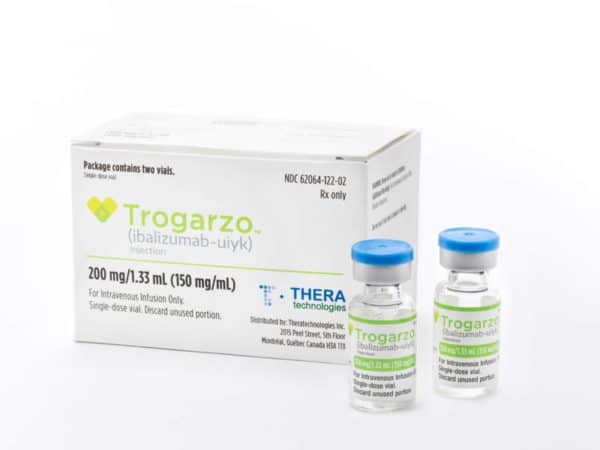Theratechnologies Is Reinventing Itself


It would be an understatement to say that specialty pharma companies have been popular among Canadian investors of late. A quick scan of the one-year charts on Cipher Pharmaceuticals (TSX:CPH), Concordia Healthcare (TSX:CXR), and BioSyent (TSXV:RX) is illustrative of how in vogue this sector has become.
With the space squarely on Canadian investor’s radar, I thought I would highlight a lesser-known Canadian specialty pharma company that warrants consideration.
I use the phrase “lesser-known” somewhat tongue-in-cheek, given that the company I am highlighting here was once a well-known Canadian drug development concern. It is one that fell on hard times but now appears on the cusp of resurrecting itself as a specialty pharma.
Montreal-based Theratechnologies (TSX:TH) was once a high-flying development stage biotech company with a late stage drug, EGRIFTA (tesamorelin for injection), for the treatment of HIV-associated lipodystrophy. For a time, it appeared the company had the biotech world by the tail; two successful Phase III studies with EGRIFTA, data published in the New England Journal of Medicine, U.S. partnership with EMD Serono (Merck Serono), and a successful FDA panel, that practically assured it of FDA approval.
FDA approved EGRIFTA in 2010 for the reduction of excess abdominal fat in HIV-infected patients with lipodystrophy and EMD Serono launched the drug in the U.S. in January 2011. That really was the end of the good times for the Theratech story. For the next three years the company was embattled, dealing with regulatory rejections and withdrawals from Europe to Columbia, lackluster U.S. sales, and manufacturing issues. Finally in May 2014, Theratech made the bold move to purchase the U.S. rights for EGRIFTA back from EMD Serono for $20 million and begin writing the next chapter of its story, as a stand-alone specialty pharma company.
The pieces for Theratech’s reinvention were put into place in 2014, with the acquisition of U.S rights for EGRIFTA, establishing a contract sales force, and solving the majority of their manufacturing issues. 2015 is all about executing.
When Theratech bought the U.S. right to EGRIFTA, it estimated the product was selling $30 million annually. However, the company found itself with a recurrence of manufacturing issues, delaying the re-launch of the product. It wasn’t until Q4 2014, with the majority of the manufacturing issues behind it, that Theratech was able to report their first quarter of independent EGRIFTA sales of $2.6 million. Perhaps more important was the encouraging tone from its investor call that Q1, 2015 sales were trending substantially higher.
Complicating the Theratech turnaround is the outstanding debt owed to EMD Serono. The $20 million cost of re-acquiring the U.S. rights to EGRIFTA, technically called an early termination fee, was to be paid in five even installments starting May 1, 2015. The payment of $4 million on May 1, 2015 would have been problematic for Theratech, given the delay in product sales caused by manufacturing issues. However, the company was able to renegotiate the terms with EMD Serono, staggering the 2015 payment over three periods (May, August, and November), giving Theratech some breathing room to grow sales.
Theratech will report its Q1 earnings in April, and analysts are expecting approximately $4 million in EGRIFTA sales, and assuming no further manufacturing issues, full year fiscal 2015 sales to return to the levels achieved by EMD Serono (i.e. $30 million range). At this level of sales, Theratech should be EBITDA and cash flow positive, and comfortably service their EMD Serono obligation.
EGRIFTA remains the only FDA approved drug for HIV-associated lipodystrophy, so with a more motivated marketing effort, there is real potential for Theratech to grow sales even higher. There is also potential that EGRIFTA will be approved in new geographies, most importantly Europe, Brazil and Mexico.
If Theratech executes in 2015 and EGRIFTA returns to EMD Serono sales levels, what should the company be worth? Arguably the most relevant comparable is Vancouver-based Cardiome (TSX: COM, Nasdaq: CRME). The two companies share a similar history, in that they both developed and partnered their lead drug, only to re-acquire the drug from the partner and to sell it themselves. Cardiome, with a market cap of approximately $160 million, reported $30 million in sales for fiscal 2014, but profitability will likely elude them for the near term. Comparing companies is always challenging, but Cardiome does provide some frame of reference for what Theratech, currently trading around a $45 million market cap, could be worth.
The pieces for Theratech’s reinvention were put into place in 2014, with the acquisition of U.S rights for EGRIFTA, establishing a contract sales force, and solving the majority of their manufacturing issues. 2015 is all about executing. If the company is able to re-establish EGRIFTA’s U.S. market presence, perhaps this time next year, I will be referencing their one-year stock chart as an indication of the popularity of specialty pharma among Canadian investors.
Disclosure: Hogan Mullally owns shares of Theratechnologies

Hogan Mullally
Writer


